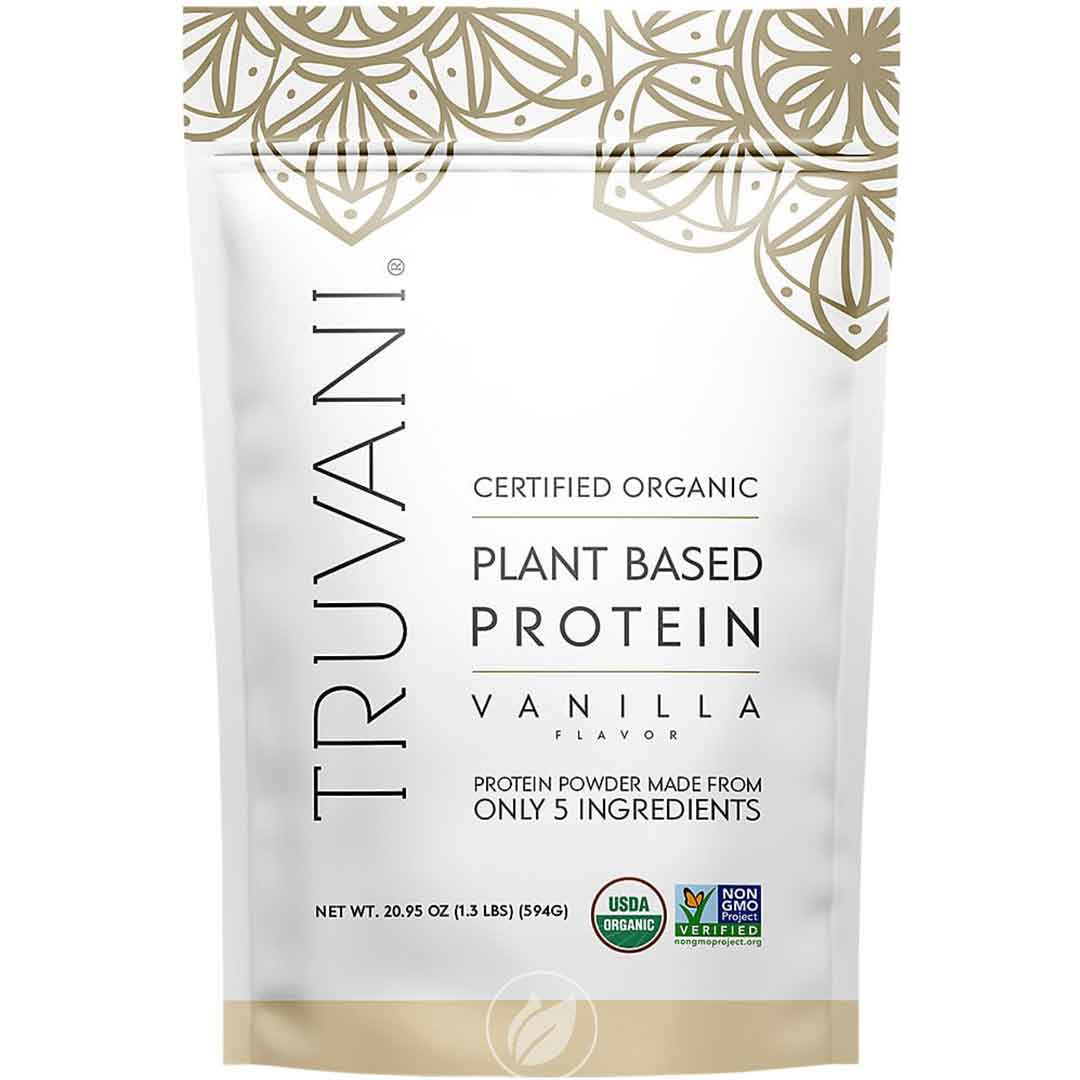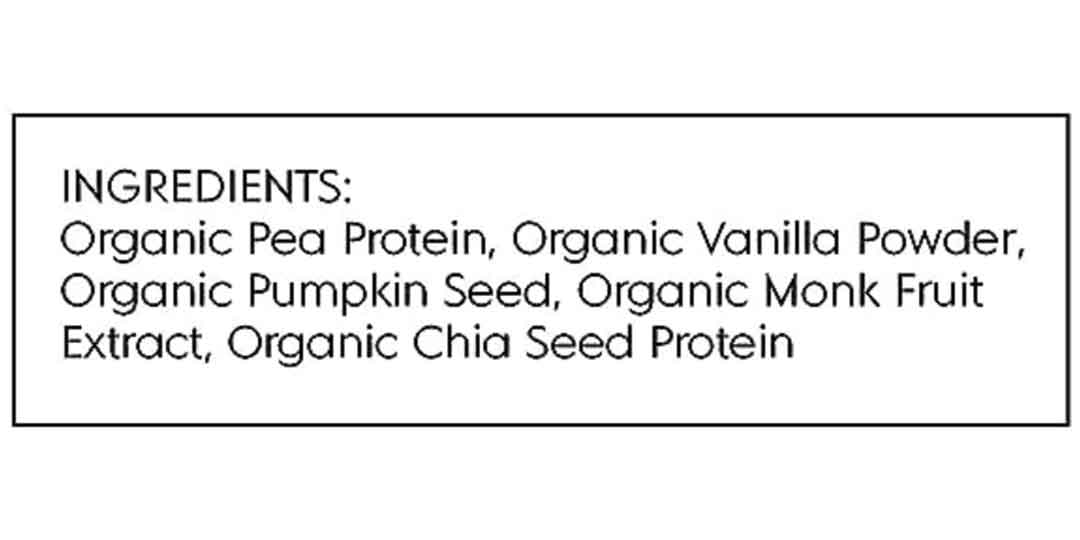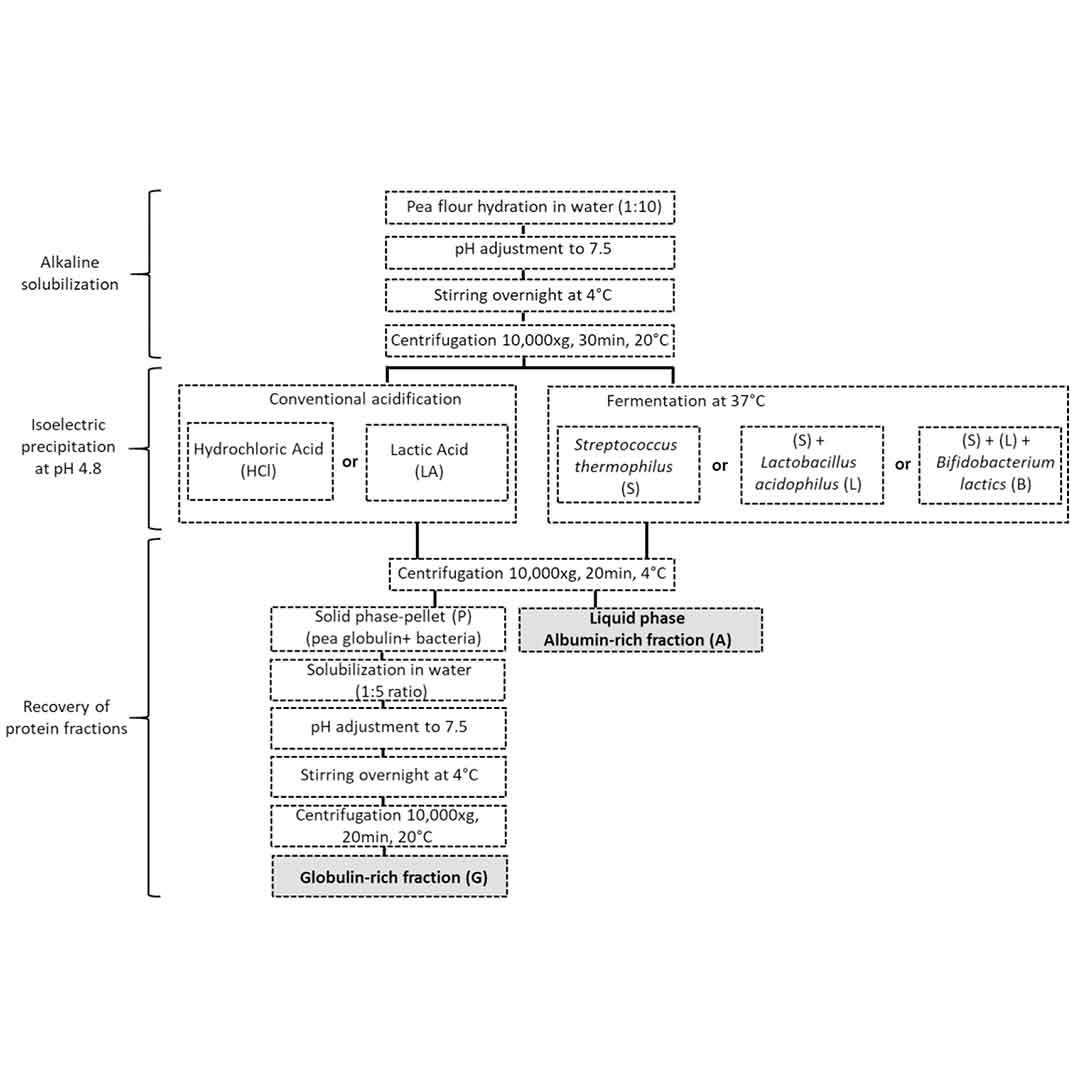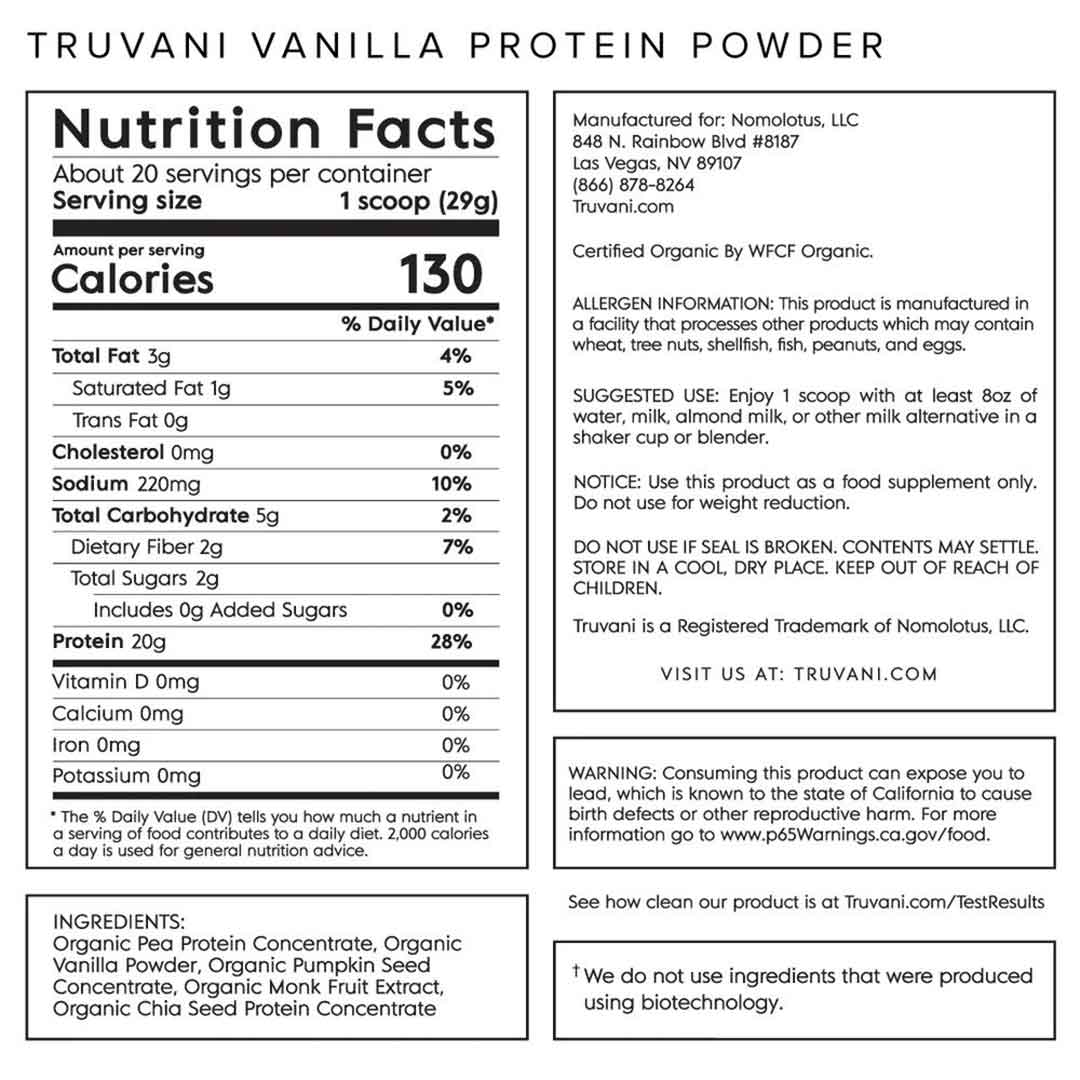Truvani Protein Powder Review
This Truvani protein powder review covers the ingredients, Nutrition Facts, taste, and much, much more. Find out whether or not Truvani protein powder is right for you.
This Truvani protein powder review covers the ingredients, Nutrition Facts, taste, and much, much more. Find out whether or not Truvani protein powder is right for you.

Written by Jack Schrupp & endorsed by Baylee Reller, RDN
The ingredients list is by far the most important indication of whether or not a protein powder is good for you, so I will start this Truvani protein powder review there. First of all, Truvani protein powder is vegan, meaning that it does not contain any animal products. Truvani protein powder is also organic, meaning that its ingredients were grown without the use of human-made pesticides and fertilizers, and that it does not contain genetically modified organisms (GMOs).
Being vegan and organic does not make Truvani healthier or more nutritious than any other protein powder, but it may be an advantage depending on who you are and what you value. For instance, vegan protein powders tend to be more environmentally-friendly than protein powders made with animal products, and organic plants contain fewer pesticide residues than conventionally grown plants.
Truvani also prides itself on having a short ingredient list. Its vanilla protein powder, for example, is made with just 5 ingredients: Organic Pea Protein Concentrate, Organic Vanilla Powder, Organic Pumpkin Seed Concentrate, Organic Monk Fruit Extract, and Organic Chia Seed Protein Concentrate. Compared to the ingredient list of most protein supplements, this ingredient list is really short.
I particularly love that Truvani uses real vanilla, and not vanilla flavoring, which can contain solvents, preservatives, and other nasty ingredients. I also love that there are no added thickeners or emulsifiers, and that Truvani uses monk fruit sweetener. Monk fruit, also known as lo han guo, is a small, melon-like round fruit native to Southeast Asia. It is a natural sugar substitute, and far better for you than the artificial sweeteners and sugar alcohols used in most protein powders.
When it comes to the ingredients, the only thing Truvani protein powder does not have going for it is the protein itself. As you can see below, Truvani protein powder contains three types of protein: Pea Protein Concentrate, Pumpkin Seed Concentrate, and Chia Seed Protein Concentrate.

Ingredients are listed by descending weight, meaning the weight of the first ingredient is greater than the weight of the second ingredient, which is greater than the weight of the third ingredient, and so on. In this case, the first and primary protein source is Pea Protein Concentrate. Looking at the other ingredients, I would not be surprised if 19 of the 20 grams of protein per serving come from Pea Protein Concentrate.
I say this because the second ingredient is Organic Vanilla Powder, which is an expensive flavoring. As someone who works with this ingredient all the time, I can confidently say there is less than 1 gram of Organic Vanilla Powder per serving, meaning there is also less than 1 gram of Pumpkin Seed Concentrate in Truvani protein powder.
Moreover, there is more Organic Monk Fruit Extract than there is Chia Seed Protein Concentrate. Organic Monk Fruit Extract, which is over 200 times sweeter than sugar, and is only ever used in small amounts. This means that there is likely considerably less than 1 gram of Chia Seed Protein Concentrate per serving. The point here is that there is hardly any Pumpkin Seed Concentrate or Chia Seed Protein Concentrate in Truvani Vanilla Protein Powder, which makes me wonder why they are added in the first place. Here is my theory.
Many plant-based protein powder companies use a blend of plant proteins to create a “complete” protein source. A dietary protein is considered to be a complete protein when it contains the nine essential amino acids that our body needs, but cannot produce on its own. Protein sources like eggs, dairy, fish, and meat are complete, whereas most plant-based proteins are not.
Pea protein is not a complete protein. Pumpkin seed and chia seed proteins are complete, but they are present in Truvani protein powder in small amounts (less than 1 gram per serving). This to me seems deceptive. It seems like Truvani is trying to give the impression that its protein powder is a complete source of protein, on par with eggs, dairy, fish, and meat, which is probably far from the truth.
I personally do not care whether or not the proteins I eat are complete, because I eat a balanced diet and get all the amino acids I need. That said, I do care when companies use deceptive practices to inflate the benefits of their product.

I would also like to mention that although I have nothing against eating peas, chia seeds, and pumpkin seeds, I am not a fan of protein concentrates. The problem with protein concentrates is that they are heavily processed derivatives of real food. There is a big difference between peas and pea protein concentrate: peas can be found in nature, whereas pea protein concentrate cannot.
At this point, you are probably wondering what a protein concentrate is. A protein concentrate is a food stripped of everything but the protein. I will not go into the details, but protein concentrates undergo heavy mechanical and chemical processing, sometimes involving solvents like hexane. This means that what you end up putting into your body looks nothing like real food.
Protein powder is intended to make increasing your protein intake more convenient. It is not a shortcut, or a nutritional hack. For whatever reason, many people think that protein powder is something special, that it will help them in ways that other sources of dietary protein cannot. This is a myth. PROTEIN POWDER IS JUST FOOD. It will not magically help you lose weight or gain muscle. It is just an easier way to get more protein into your diet. Your protein powder should therefore look like food, not a science experiment.
I believe in real foods, not just from a nutritional standpoint, but also from a gut-health perspective. Heavily-processed or refined foods like protein concentrates can be hard to digest for some people. They can cause bloating, cramps, constipation, diarrhea, gas, nausea, and stomach pain for the simple reason that they do not look like real food. If you think about it, your gut was designed to digest naturally occurring foods, not laboratory-formulated imitations, so if you feed it anything but real food, it might get upset.
The long term implications of eating processed foods are still not well understood, but more and more research is finding that it can alter the composition of your gut microbiota – the collection of microorganisms that help you digest food – leading to chronic GI problems, widespread inflammation, and permanent damage to the gut microbiome. This does not mean that Truvani protein powder is necessarily bad for you, it just means that if you can find a more natural alternative, you should use it.

1 serving of Truvani vanilla protein powder contains 130 calories, 2 grams of sugar, and 20 grams of protein. This is standard for a plant-based protein powder, and looks good to me. If you are on a low sodium diet, you may want to keep in mind that 1 serving contains 220 mg of sodium. Many pea proteins contain a fair amount of sodium because many pea protein concentrates are made by extracting protein from green or yellow split peas using a dilute salt solution as the extracting agent.
Taste is so subjective that I hesitate to include it in this Truvani protein powder review. A protein powder that one person loves might make another person gag, so if you read product reviews on Amazon, you will find both 5 star reviews and 1 star reviews of the same exact recipe. For the sake of this Truvani protein powder review, however, I will share my thoughts on how Truvani tastes and mixes.
Truvani protein powder tastes ok. It is chalky, too sweet, and has a viscous texture. It does mix well, however, and does not have an artificial aftertaste. As is the case with every protein powder, it tastes much better when mixed with milk than with water.
Truvani protein powder is one of the best protein powders out there. As you just learned, however, it is not perfect. Its biggest weakness, which is a weakness for most protein powders, is that it is made with heavily-processed protein concentrates.
Unfortunately for Truvani, there is just no way to make protein powder with peas without first stripping them of the fats, carbohydrates, and other nutrients. Peas are not naturally high enough in protein to be used as protein powder without processing.
This is the point in the article where I shamelessly pitch my own protein powder company, not because I just want to sell you something, but because it is a more natural alternative to Truvani. Hi! My name is Jack, and I am the founder of drink wholesome. A few years ago, I was sick and tired of protein supplements that upset my stomach, so I made my own with a short list of simple ingredients.
Instead of protein concentrates or isolates, I use egg whites and almonds. Minimally-processed ingredients like these are a gut-friendly, natural alternative to protein concentrates and isolates. Moreover, unless you have a sensitivity or allergy to eggs, egg white protein is the best protein for your gut. My customers have experienced fewer digestive issues with egg white protein powder than with any other type of protein supplement. If you cannot eat eggs, our almond protein powder is easy to digest too, and a great option for vegans.
Organic Pea Protein Concentrate, Organic Vanilla Powder, Organic Pumpkin Seed Concentrate, Organic Monk Fruit Extract, and Organic Chia Seed Protein Concentrate.
Like Truvani, drink wholesome is additive-free and dairy-free. Unlike Truvani, it is made with real foods. This might seem like a small difference, but in the long term, it could change your life. Stick to real foods, your gut will thank you.
The “gut,” also known as the gastrointestinal (GI) system, is made up of several organs including the stomach, small intestine, large intestine, and colon. The term “gut microbiome” refers to the microorganisms living in your intestines, and the term “gut health” describes the function and balance of these organisms.
Your gut does much more than just help you digest food. It also protects against pathogens, educates your immune system, and affects directly or indirectly most of your physiologic functions.
Several recent studies have examined the role of the gut in diagnosis, prognosis, and treatment of a variety of diseases, and have concluded that it plays an integral role in overall health. It follows that you should consider the ways in which the foods you eat affect your gut. You should also consider the potentially enormous impact of protein powder. Protein powder is not just any food, it is a food that you probably consume regularly, if not daily.
“I’ve had Crohn’s disease for 20+ years and it’s always been hard to find a protein powder my stomach can handle. I’ve had no problem digesting drink wholesome AND it tastes great. I highly recommend this protein powder if you have IBS or Crohn’s.” – Jesse
Read more reviews or take the quiz.
This content is not intended to be a substitute for professional medical advice, diagnosis, or treatment. drink wholesome is not intended to diagnose, treat, cure or prevent any disease.